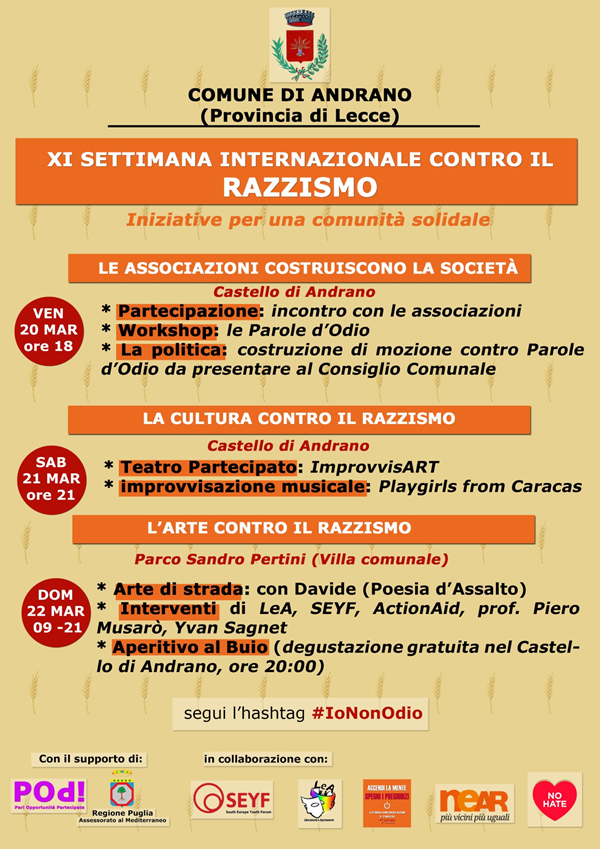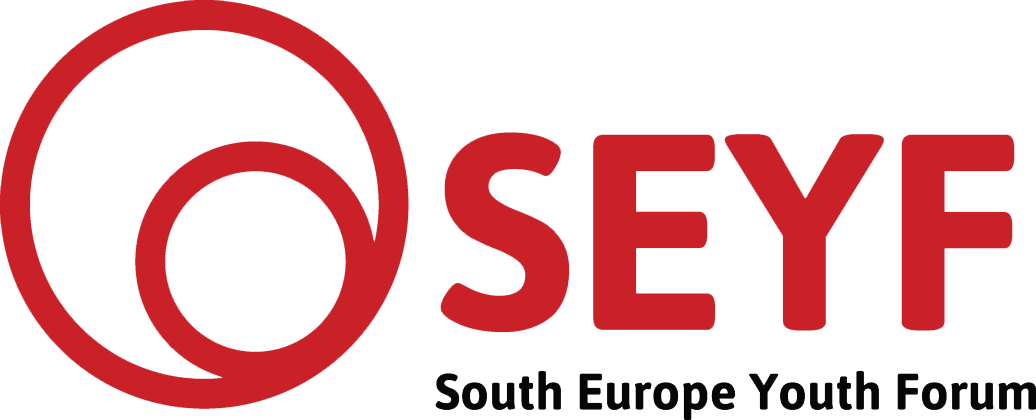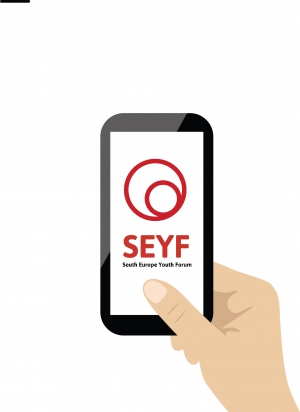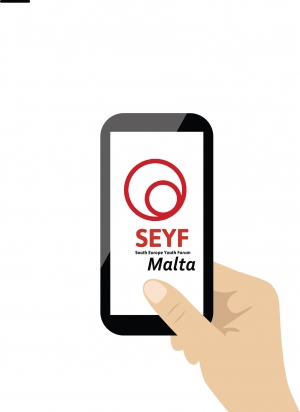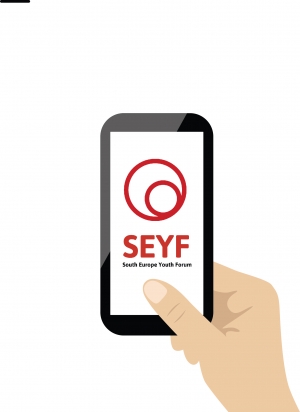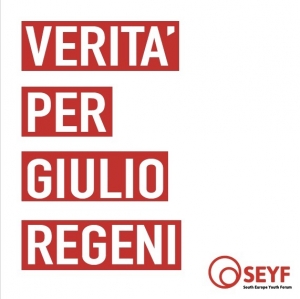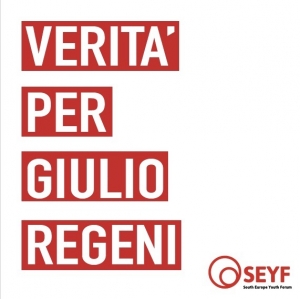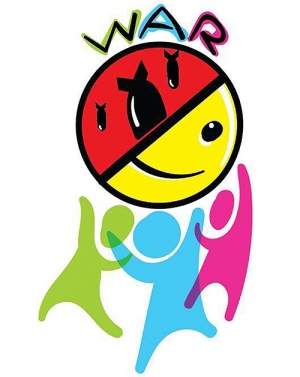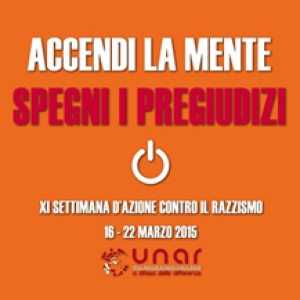SEYF
Giovani e Politica: arriva Salento Smart Sessions
Scarica la APP di SEYF
Nasce la APP di SEYF per tenerti sempre aggiornato, ovunque vai, ovunque sei, qualunque cosa tu stia facendo!
Nokia, Apple, Android? Noi non discriminiamo... SEYF è per tutti! ;-)
Download the APP of SEYF Malta!
We have released our brand new APP of SEYF network, so to let you be constantly updated wherever you are, wherever you go and whatever you are doing!
Nokia, Apple, Android? We do not discriminate... SEYF is for ALL!! ;-)
Scarica la APP di SEYF
Nasce la APP di SEYF per tenerti sempre aggiornato, ovunque vai, ovunque sei, qualunque cosa tu stia facendo!
Nokia, Apple, Android? Noi non discriminiamo... SEYF è per tutti! ;-)
Verità per Giulio Regeni
"Giulio non era una spia, era un ragazzo del futuro"
Tutto il network di SEYF chiede unito e a gran voce Verità per Giulio Regeni, affinché mai più la ricerca della verità sia relegata nel Medioevo della paura e del terrore, ma diventi punto di nevralgico per la valorizzazione delle risorse intellettuali per tutti quei giovani che, col loro coraggio, rendono onore alla nostra umanità.
Verità per Giulio Regeni
"Giulio non era una spia, era un ragazzo del futuro"
Tutto il network di SEYF chiede unito e a gran voce Verità per Giulio Regeni, affinché mai più la ricerca della verità sia relegata nel Medioevo della paura e del terrore, ma diventi punto di nevralgico per la valorizzazione delle risorse intellettuali per tutti quei giovani che, col loro coraggio, rendono onore alla nostra umanità.
We Are Coming Rougher: Youth Exchange in Italy 3-12 June 2016
Would you like to take part to an amazing and intercultural experience in Italy?
We are inviting you to participate to the youth exchange We are Coming Rougher from 3 to 12 June to be held from the SEYF network.
GIORNATA MONDIALE DEL SERVIZIO SOCIALE IL 31 MARZO
L’Università del Salento ha promosso una giornata dedicata al Servizio Sociale il 31 Marzo 2015 a Lecce nel cortile esterno del palazzo Codacci-Pisanelli (Unisalento).
In occasione del World Social Work Day dello scorso 17 marzo 2015 il Corso di Studio in Servizio Sociale e in Progettazione e Gestione delle Politiche e dei Servizi Sociali, d'intesa con l’AIDOSS (Associazione Nazionale Docenti di Servizio Sociale), ha organizzato anche quest’anno un momento celebrativo attraverso un OPEN FORUM rivolto a studenti e assistenti sociali sui temi del Servizio Sociale e promozione della dignità e del valore delle persone il giorno 31 marzo 2015.
Un evento che ha avuto come obiettivo il confronto aperto, informale, spontaneo, alternativo, costruendo tavoli di discussione per ampliare la conoscenza e le reti di collaborazione.
L’incontro si è articolato attorno a quattro temi che sono stati affrontati parallelamente:
1. Sostenere i diritti umani per tutti
2. Comunità rispettosa=Futuro sostenibile
3. Assistenti sociali garanti della dignità umana
4. Esperienze dirette.
Anche SEYF ha preso parte al confronto, portando la sua esperienza diretta all'interno del dibattito accademico, offrendo le proprie conoscenze e istanze sui temi della progettazione sociale e partecipata, del networking strutturato e del dialogo interculturale.
scarabEU: participation and democracy
![]()
ScarabEU has been a youth exchange developed by SEYF and supported by the Erasmus Plus Programme in cooperation the Municipality of Melpignano.
It took place in Melpignano, a village in the South of Italy, from 14th to 24th Ooctober 2015.
The project involved 40 young people from 5 from Greece, Italy, Spain, Malta and Poland. The main theme of the project has been Participation of Young People, by exploring the new ways of young people best involvement in youth projects, educating them to a stronger sense of active citizenship.
The main objectives are:
- to improve processes participation knowledge, democracy and sustainability;
-to seek alternative / innovative forms for the spread of common values of democracy and active participation;
- to stimulate creativity and talents of young people involved,(making participants able to use them concretely) with the objective of their concrete use -in their respective daily life;
- provide for the territory an opportunity of comparison with other European countries;
- turn a space disused in a space for young people aggregation, useful for the improvement of their knowledge.
![]()
ScarabEU è uno scambio di giovani di SEYF realizzato nell’ambito del programma Europeo Erasmus+, in collaborazione con il Comune di Melpignano.
Il progetto, implementato da SEYF In cooperazione col Comune di Melpignano, ha previsto la condivisione di approcci fortemente partecipativi che hanno stimolato la cittadinanza attiva
sui temi dell'intercultura e dell'integrazione.
Il progetto è stato realizzato a Melpignano dal dal 14 al 24 ottobre 2015, con il coinvolgimento eccezionale di 40 giovani tra i 18 e i 25 anni provenienti da Grecia, Italia, Spagna, Malta e Polonia.
Le sue attività saranno implementate in provincia di Lecce, nel periodo dal 14 al 24 ottobre 2015. Il progetto coinvolgerà 40 giovani, membri di organizzazioni giovanili operanti in Grecia, Italia, Spagna, Malta e Polonia. Il tema principale dello scambio giovanile è la partecipazione dei giovani e il loro ruolo attivo nella società. Attraverso la condivisione, il monitoraggio, l’analisi, le valutazioni, il racconto di esperienze, conoscenze e buone pratiche, il progetto stimolerà i giovani verso la tendenza di un approccio pienamente partecipativo.
Gli obiettivi principali sono stati :
- migliorare la conoscenza dei processi di partecipazione, democrazia e sostenibilità;
- cercare forme innovative/alternative per la diffusione di valori comuni di democrazia e di partecipazione attiva;
- stimolare la creatività e il talento dei giovani coinvolti con l’obiettivo del loro uso concreto nella loro rispettiva vita quotidiana;
- fornire al territorio una opportunità di confronto con altre culture e altri paesi Europei;
- valorizzare spazi pubblici ai fini di attività e progetti giovanili.
scarabEU - Impatto del progetto
Scarabeu - The impact of the project
Leggi il report sulla disseminazione, la valutazione e l'impatto del progetto [ITA]
Contro tutti i Razzismi
SEYF è stato partner del Comune di Andrano insieme a LeA e Rete Near nell'organizzazione della XI Settimana Internazionale contro il Razzismo promossa da UNAR.
L’iniziativa ha preso il via all’interno del Progetto POP! (Pari Opportunità Partecipate) per la promozione di un cultura dei diritti umani partecipati, col supporto dell’Assessorato al Mediterraneo della Regione Puglia.
Nato da un’idea del network di associazioni SEYF e di LeA - Liberamente e Apertamente, l’iniziativa rientra negli eventi promossi da UNAR (Presidenza del Consiglio dei Ministri - Pari Opportunità), in collaborazione con rete NEAR.
“Gli eventi in programma hanno rappresentato appuntamenti importantissimi -sottolineano gli organizzatori- per costruire una comunità della tolleranza. Un percorso di eventi che portano alla costruzione di una comunità solidale che diventa più ricca delle sue differenze. Attraverso incontri mirati costruiremo una comunità dell’integrazione, contro lo stereotipo, il pregiudizio e il bullismo imperante sui social network”. Dagli incontri emergeranno proposte di buone pratiche che verranno sottoposte al Consiglio Comunale del 24 Marzo 2015, che sarà il primo, in Europa, ad aderire al movimento Europeo contro le Parole di incitamento all’Odio.
L’hashtag della manifestazione: #IoNonOdio
![]()
Mozione Presentata Del Comune Di Andrano “Contro Le Parole Di Incitamento All’odio” Approvata All'unanimita' Dal Consiglio Comunale Il 24/03/2015
![]()
Motion Against Hate Speech Unanimously Approved Presented By The Municipality Of Andrano (24/03/2015)
